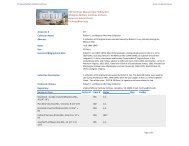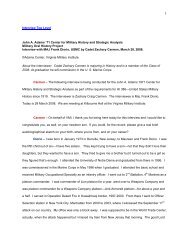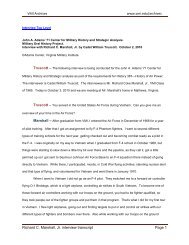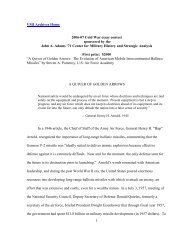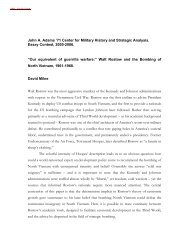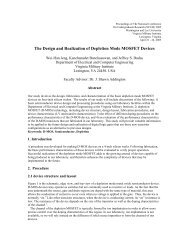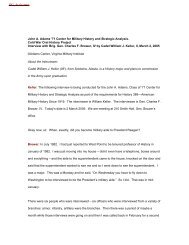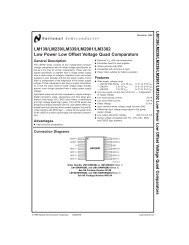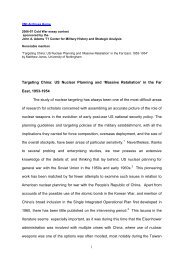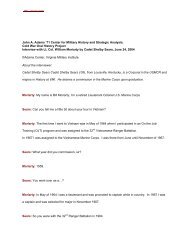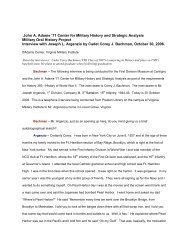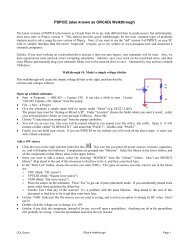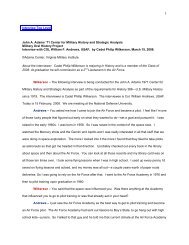Academic Catalog - Virginia Military Institute Admissions
Academic Catalog - Virginia Military Institute Admissions
Academic Catalog - Virginia Military Institute Admissions
Create successful ePaper yourself
Turn your PDF publications into a flip-book with our unique Google optimized e-Paper software.
Prizes, medals, and awards<br />
ACADEMIC AWARDS<br />
The Lieutenant General Edward Mallory Almond ’15 Award for<br />
<strong>Academic</strong>-Athletic-<strong>Military</strong> Excellence. Established by the General John<br />
H. Forney Historical Society of Alabama in 1981 as a memorial to General<br />
Almond. Given annually to a graduating cadet who has made outstanding<br />
contributions to VMI’s intercollegiate athletic program while distinguishing<br />
himself through academic achievement and soldierly bearing and aptitude.<br />
The Stewart W. Anderson Award. Established in 1977 by gifts of relatives<br />
and former students to provide a certificate and cash prize to be presented<br />
to the graduate having a superior academic performance in the electrical<br />
engineering curriculum. The award is in honor of Brigadier General Stewart<br />
Wise Anderson, Class of 1908, to recall his 46 years of devoted service to<br />
VMI as a member of the faculty. He was head of the Department of Electrical<br />
Engineering for 21 years and Dean of the Faculty for 14 years.<br />
The John Ryd Bush Award. This award recognizes the fourth classman<br />
whose military character and proficiency are most noteworthy. It was<br />
established in 1944 by William E. Bush as a memorial to his son, a member<br />
of the Class of 1946, who died in 1944 as a result of an accident while<br />
on Army duty during World War II.<br />
John Randolph Tucker Carmichael Award. Established in 1951 by<br />
the Class of 1931 as a memorial to their classmate, Dr. John Randolph<br />
Tucker Carmichael, who died in 1941. The award, based upon unusual<br />
academic achievement and excellence of character, is made to a third<br />
class biology major.<br />
The Society of the Cincinnati Medal. In 1913 the Society of the Cincinnati<br />
in the State of <strong>Virginia</strong> established a fund to provide annually a medal<br />
to be awarded by the faculty to the member of the graduating class<br />
most distinguished by efficiency of services and excellence of character<br />
throughout his/her cadetship.<br />
The Company Cup. Established in 1970, an award to the company with<br />
the highest combined average GPA for the fall and spring semesters upon<br />
which their company and year is engraved.<br />
Civil Engineering Award. A cash award to the graduating civil engineering<br />
major who is declared by the department head to hold the highest academic<br />
standing at graduation.<br />
The Class of 1941 Award. An award to the first-standing second classman<br />
majoring in civil engineering, established by Colonel Alvin F. Meyer, ’41.<br />
The Major General Richard C. Coupland ’15 Electrical Engineering<br />
Awards. Established in 1991, and awarded to a second and third classman,<br />
majoring in electrical engineering, who have demonstrated academic<br />
excellence, outstanding leadership abilities, and high moral standards.<br />
The Dearing Medal. Established as a memorial to her son, Asa S. Dearing,<br />
Class of 1891, by Mrs. P. M. Dearing, the Dearing Medal is awarded annually<br />
to the member of the graduating class who has demonstrated the highest<br />
proficiency in the study of English and English literature.<br />
Colonel Herbert Nash Dillard ’34, Memorial Award. Established in<br />
1977 in memory of Colonel Herbert Nash Dillard ’34, senior professor of<br />
English, department head for eight years, director of the VMI Glee Club<br />
for twenty years, and a member of the VMI faculty for thirty-eight years.<br />
The cash award and certificate are to be presented to a member of the<br />
graduating class judged by the faculty and staff as the cadet best emulating<br />
the scholarship and dedication to a broad liberal arts education which<br />
characterized Col. Dillard. Consideration will be given to proficiency in a<br />
chosen field of study, leadership in the Corps of Cadets, and outstanding<br />
accomplishments in the extracurricular program of the <strong>Institute</strong>.<br />
The John H. French Medal. Dr. John H. French, of New York, Class of<br />
1879, gave to the <strong>Institute</strong> a sum of money which provides a medal for the<br />
member of the graduating class for highest proficiency in mathematics.<br />
The Leslie German Second Class Award. A cash prize to a second<br />
class chemistry major for excellence in the study of analytical chemistry.<br />
This award was established in 1973 by an anonymous donor in honor<br />
of Colonel Leslie German who served on the faculty for thirty-five years<br />
until his retirement in 1968. Colonel German was head of the Chemistry<br />
Department for twenty-eight years.<br />
John Bowie Gray 1867 Award. Established by the late Miss Aylmer Gray<br />
as a memorial to her father, a New Market Cadet. It is awarded to a third<br />
classman standing first in civil engineering.<br />
Colonel Sterling Murray Heflin ’16 <strong>Academic</strong> Proficiency Award.<br />
Established in 1988 as a cash prize awarded to the recipient of the Second<br />
Jackson-Hope Medal.<br />
The Larry L. Jackson ’62 Undergraduate Research in Chemistry Award.<br />
Established in 1999 by Dr. Larry L. Jackson ’62 and his wife, Lindy Lou<br />
White Jackson. A cash award presented to an upperclass cadet majoring<br />
in chemistry in order to reward past excellent performance in research and<br />
to encourage future research endeavors.<br />
Jackson-Hope Medals. In 1867 the Honorable A. J. B. Beresford Hope,<br />
member of the British Parliament and representative of an association<br />
that had presented to the Commonwealth of <strong>Virginia</strong> a statue of Thomas<br />
J. Jackson, sent to Governor James L. Kemper the remainder of the<br />
statue fund, requesting that it be used for a further memorial to the great<br />
Confederate soldier. The Governor proposed and the Board of Visitors<br />
approved the establishment of two “Jackson-Hope Medals” to be presented<br />
annually to the two most distinguished graduates of the <strong>Institute</strong>, and<br />
since the first awards in 1877, the Jackson-Hope Medals have been VMI’s<br />
highest awards for scholastic achievement.<br />
The Stonewall Jackson Memorial Award. Established in 1957 by the<br />
United Daughters of the Confederacy to honor the great Confederate<br />
hero. The prize is presented annually to the first standing graduate in the<br />
physics curriculum.<br />
Philip H. Killey 1941 Award. Established in 1943 by the parents of Philip<br />
H. Killey, who lost his life in North Africa during World War II. The award,<br />
based upon unusual academic achievement and excellence of character,<br />
is made to a second class biology major.<br />
Alfred H. Knowles 1933 Award. Established by H. C. Knowles of<br />
Rochester, New York, in memory of his son, a member of the Class of<br />
1933, who died as the result of an accident at home on Christmas furlough<br />
during his senior year. This award, based upon class standing, is made to<br />
a graduating biology major.<br />
The Colonel Robert H. Knox Prize. Memorial prize established in 1985<br />
by the family of Colonel Robert H. Knox, VMI class of 1924, who taught<br />
mathematics at VMI for 42 years until his retirement in 1969. Awarded<br />
annually to a member of the third class selected by the faculty of the<br />
mathematics department as the most promising mathematics major of<br />
that class.<br />
The Richard Driggs LeMay, Jr. Award. Established in 1978 as a memorial<br />
to Major R. D. LeMay, Jr., ’62, helicopter pilot and officer in the Fourth Air<br />
Cavalry, First Infantry Division. He was killed in action during his second<br />
tour of duty in Vietnam in September 1968. A cash prize is awarded to<br />
that cadet deemed most proficient in military history.<br />
The Ralph Bowen Linville Award. Established in 1964 by Mrs. Linville as<br />
a memorial to her husband who served on the chemistry faculty from 1947<br />
to 1957. Awarded for excellence to a new cadet majoring in chemistry.<br />
The Sumter L. Lowry Award. The first winner of the Cincinnati Medal,<br />
Major General Sumter deLeon Lowry, Class of 1914, has donated a sum of<br />
money to the VMI Foundation, Inc., for the purpose of providing a further<br />
cash prize to the winner of the Cincinnati Medal.<br />
George C. Marshall Citizen-Soldier Award. The award is given bi-annually<br />
to a first classman or rising first classman best modeling the attributes<br />
displayed by George C. Marshall as a cadet.<br />
23




